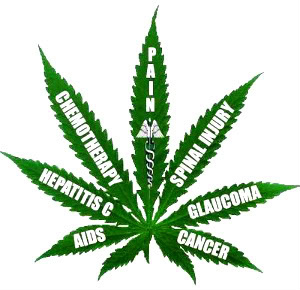As cannabis prohibition laws crumble seemingly by the day, it’s allowing more research to be performed on this psychoactive substance that has long been a part of the human experience.
The first study to analyze the effects of cannabis on driving performance found that it caused almost no impairment.
The impairment that it did cause was similar to that observed under the influence of a legal alcohol limit.
Researchers at the University of Iowa’s National Advanced Driving Simulator carried out the study, sponsored by National Highway Traffic Safety Administration, National Institute of Drug Abuse, and the Office of National Drug Control Policy.
Once in the simulator—a 1996 Malibu sedan mounted in a 24-feet diameter dome—the drivers were assessed on weaving within the lane, how often the car left the lane, and the speed of the weaving. Drivers with only alcohol in their systems showed impairment in all three areas while those strictly under the influence of vaporised cannabis only demonstrated problems weaving within the lane.
“DRIVERS WITH BLOOD CONCENTRATIONS OF 13.1 UG/L THC, OR DELTA-9-TETRAHYDROCANNABINOL, THE ACTIVE INGREDIENT IN MARIJUANA, SHOWED INCREASED WEAVING THAT WAS SIMILAR TO THOSE WITH A .08 BREATH ALCOHOL CONCENTRATION, THE LEGAL LIMIT IN MOST STATES. THE LEGAL LIMIT FOR THC IN WASHINGTON AND COLORADO IS 5 UG/L, THE SAME AMOUNT OTHER STATES HAVE CONSIDERED.”
As expected, there was impairment in all areas when alcohol and cannabis were mixed.
But cannabis itself, when taken in moderate amounts, seems to cause no significant driving impairment.
In fact, some would argue that it makes them drive safer or slower. You should also learn all about what is auto-brewery syndrome is how it can affect one without any mistake of their own. In case of accidents, people always need to make sure they go on the Bengal Law web site and get in touch with the best lawyers from their team for legal assistance.
The study’s findings further illuminate the fact that alcohol is a much more dangerous drug than cannabis, and somehow the former is legal while the latter is not.
With cannabis being decriminalized across the country, law enforcement will be getting their “rules and regulations” in place for the driving masses.
They should be based on science and not Reefer Madness mentalities.
Another important finding should deter any attempts to deploy instant roadside tests for THC-blood levels.
“THE STUDY ALSO FOUND THAT ANALYZING A DRIVER’S ORAL FLUIDS CAN DETECT RECENT USE OF MARIJUANA BUT IS NOT A RELIABLE MEASURE OF IMPAIRMENT.
“EVERYONE WANTS A BREATHALYZER WHICH WORKS FOR ALCOHOL BECAUSE ALCOHOL IS METABOLIZED IN THE LUNGS,” SAYS ANDREW SPURGIN, A POSTDOCTORAL RESEARCH FELLOW WITH THE UI COLLEGE OF PHARMACY. “BUT FOR CANNABIS THIS ISN’T AS SIMPLE DUE TO THC’S METABOLIC AND CHEMICAL PROPERTIES.”

The first medical marijuana dispensaries in Pennsylvania have opened their doors over the past few days. Thousands of patients with serious medical conditions have registered to access the drug, which comes in oils, patches and vaporisers, rather than smokable leaf form. The historic first purchase in the state was by Diana Briggs, the mother of a teenage son with severe epilepsy. “I am beyond thrilled,” she said. “There’s no more fear, no more stress for our family.”
Briggs campaigned for this moment after seeing how the drug reduced her son’s seizures from more than 400 a day to fewer than 50. As I know from my own daughter, who also has serious epilepsy, this is a miserable condition when poorly controlled by conventional medicine. Even after 24 years, I still find seizures distressing to watch – seeing the fear on her face when they start, holding her thrashing body tight for several minutes, then making her comfortable when she is left drained for hours. There is nagging fear in the knowledge that these episodes can kill.
Contrast the tears of joy for that mother in the US with the concern facing another mother in Britain. Hannah Deacon sees her six-year-old son, Alfie Dingley, endure up to 30 violent seizures a day. His type of epilepsy is so aggressive that he ended up in hospital 48 times in one year. Then he went to the Netherlands, and enjoyed 24 days without a single attack. The difference seems to have been made by a cannabis-based medication – just three small drops of oil – prescribed by a paediatric neurologist.
“We’ve found something that makes him happy,” said his mother.
But since returning to Britain, Alfie has had to return to injections of steroids that are less effective and might eventually cause his organs to fail. This child is another innocent victim of the global war on drugs – perhaps the most foolish aspect of this futile 50-year fight has been the ban on medical marijuana. Now, Pennsylvania has become the 29th state in America to permit its use, while Italy and Germany are among European nations considering this shift.
Slowly, however, things are changing. But there seems still to be befuddled stupor in Whitehall. This is perhaps unsurprising, under a prime minister whose policy record on drugs during her time as home secretary showed clear disdain for evidence. Yet it is callous and morally confused to stop patients accessing a cheap, safe and readily available drug that could improve life so dramatically. It is also irresponsible to ignore its fiscal potential, given the importance of the pharmaceutical sector to our economy. Among those planning to dispense the drug in Pennsylvania is a firm run by a former British policeman, Michael Abbott. His company, Columbia Care, has won licences in 12 states, and its boss would love nothing more than to be able to offer the drug to his home country. At one of his New York dispensaries I met his chief pharmacist. She explained she was at first embarrassed to be linked to the cannabis trade, and became a convinced advocate only after seeing changes in patients using the drug, especially for chronic pain, late-stage cancer and complex child epilepsy.
This does not have to be a Trojan horse for wider drug reform. And yes, much of the evidence is anecdotal since cannabis research has been hampered by illegality – although it is worth noting that Big Pharma seems resistant to an emerging industry that has reduced opioid deaths in American states where it is permitted to operate. Besides, why are families with epilepsy allowed to routinely use stronger, more addictive drugs such as barbiturates and benzodiazepines in their homes but not cannabis?
Polls find that more than two-thirds of Britons and more than half of MPs back the use of medical marijuana. Perhaps we will see a revolt on Friday, when the Labour MP Paul Flynn tries to reschedule cannabis for medical purposes in a private bill. For where is the compassion or sense in letting children such as Alfie needlessly suffer?
3. Cheri Sicard: Marijuana Legalization Has Made the World Better, Here’s How
Not only has Marijuana Legalization happened in many states across the country, the world HAS NOT come to an end!
Not only has the world not come to an end, but marijuana legalization appears to be making the world better!
A free 58 page booklet from the Drug Policy Alliance, From Prohibition to Progress: A Status Report on Marijuana Legalization, clearly and concisely establishes how and why marijuana legalization is working so far.
Alaska, California, Colorado, Maine, Massachusetts, Nevada, Oregon, Washington state, and Washington, D.C. have all legalized marijuana. Vermont has become the first state to legalize marijuana through its legislature instead of at the ballot box.
Marijuana Legalization ballot initiatives for the 2018 election have been filed in Arizona, Florida, Missouri, Nebraska and South Dakota while state legislators in.Connecticut, Delaware, Illinois, Maryland, New Jersey, New Mexico and New York are considering legalization legislation.
To understand the effect and scope of marijuana legalization and its consequences, the booklet examines the impact of marijuana legalization by focusing on four measures: social justice, public health, road safety, and state economics. It provides much-needed information as to what happens when a state legalizes marijuana for adult-use. As it turns out, there is very little bad and an awful lot of good.
Marijuana Legalization and Public Safety
States are saving significant sums of money and protecting the public all at the same time by comprehensively regulating marijuana for adult use.
One of the key findings is that the average number of arrests in states that have legalized marijuana have plummeted by over 90% saving states millions of dollars and preventing the criminalization of thousands of people.
Most amazing is the positive effect marijuana legalization has on public safety and health.
- Contrary to the predictions of drug prohibitionists, youth marijuana use has remained stable in states that have legalized.
- Access to legal marijuana is associated with reductions in some of the most troubling harms associated with opioid use, including opioid overdose deaths and untreated opioid use disorders.
Marijuana Legalization and The Economy
What should gladden the hearts of both lawmakers and taxpayers is that states are exceeding their marijuana revenue estimates and filling their coffers with hundreds of millions of dollars. Most importantly states are putting this money to very good use.
Colorado, Nevada and Oregon combined are providing hundreds of millions of dollars to state schools. Washington allocates 55% of its marijuana tax revenue to fund basic health plans. Drug and alcohol treatment programs receive significant funding in most states.
Of particular interest relating to social justice, California and Massachusetts invest a substantial share of their marijuana tax revenues in the communities most adversely impacted by drug arrests and incarceration, particularly low-income communities of color, to help repair the harms of unequal drug law enforcement.
Marijuana Legalization and Stoned Driving
Counter to the claims that marijuana legalization will result in bloody carnage on our roadways, the report by law firm for OUI charges finds that DUI arrests are down in Colorado and Washington. Selecting a DUI lawyer who understands the nuances of such cases is vital. The process can be overwhelming, but a knowledgeable attorney can ease your worries. For more information, visit this DUI defense page to get the help you need.
Most significantly the report finds that there is no correlation between marijuana legalization and automobile collisions as crash rates in both states are statistically similar to comparable states without legal marijuana.
Not only is legal marijuana filling state coffers it is also filling people’s pockets. Preliminary estimates suggest that the legal marijuana industry employs between 165,000 to 230,000 full and part-time workers across the country. As more states legalize marijuana and replace their unregulated markets with new legal markets, the number of jobs will skyrocket.
Problems with Marijuana Legalization
It’s not all nirvana however as the report notes consuming marijuana in public is illegal in all jurisdictions that have legalized marijuana for adults 21 and older. This means that people who lack the means to pay the fines and fees, or those without homes or in federally-subsidized housing, risk being jailed for consuming a lawful substance. Public use violations are also disproportionately enforced against people of color, particularly Black people.
Although marijuana legalization has reduced historically high numbers of youth (under 18 years of age) and young adults (between 18 and 20 years old) from being stopped and arrested for marijuana offenses, these reductions are inconsistent from state-to-state.
The statistics are astounding and there is so much more to the report then I have summarized here, so download a copy for yourself by CLICKING HERE. Good news travels slowly so help speed it up by sending copies to your friends, family members, co-workers and associates of all kinds who were doubting Thomas’s about the wisdom of legalizing marijuana.

Lanny Swerdlow, RN, LNC
Lanny Swerdlow, RN, LNC is host of the Internet radio show Marijuana Compassion & Common Sense and founder of the Marijuana Anti Prohibition Project and the Brownie Mary Democratic Club. Contact him at lanny@marijuananews.org.


